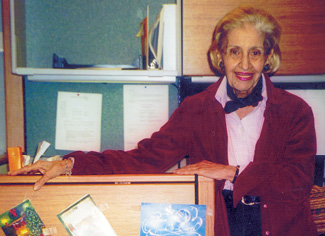 Jacqueline Block's career has spanned decades, time zones and fluctuating hemlines, but one thing's for sure — she's always been on the cutting edge of fashion history.
Jacqueline Block's career has spanned decades, time zones and fluctuating hemlines, but one thing's for sure — she's always been on the cutting edge of fashion history.
Jacqueline (Boomis) Block '52 was born in Independence, Kan., but moved to Wichita with her parents and two siblings in 1939. She later attended Lindenwood College in St. Charles, Mo., where she took in lectures by poet Edith Sitwell, Andrei Kerensky, briefly head of Russia's government in 1917, and the editors of The New York Times and The Atlantic Monthly.
At the end of her sophomore year, she transferred to the Municipal University of Wichita, where she majored in English language and literature, minored in history and met Sylvia Goodman Smith '54, who became a lifelong friend and shopping companion.
Block's fashion career began during her senior year with Vogue magazine's 17th Annual Prix de Paris, a prestigious writing competition which the previous year, 1951, had crowned Jacqueline Bouvier winner.
The contest consisted of several rounds of writing assignments, which covered two categories: academic and fashion-related. Block recalls one of the academic assignments: "From the turn of the century to the present, explain how music, art and literature has influenced the 20th century." For one fashion-related assignment, she chose to "interview a woman in your community who is considered to be a fashion leader."
She tracked down Olive Ann Beech, who called her "the most persistent young woman I have ever known" for showing up on her porch one evening after Beech had twice turned down the interview.
Beech's favorite designer, Block says, was the French-born Pauline Trigere, "a master tailor who always gave her designs an unexpected feminine touch."
At WU's dean's reception for women graduates, Block learned she had made it to Vogue's finals with 99 other women, out of an original pool of 1200. While she did not win, she can hardly be disparaged for it — the winner was Sylvia Plath.
Block's finalist status helped her enter New York City's Tobé-Coburn School for Fashion Careers, a school on Madison Avenue that Block explains was the realized dream of two women, the diminutive "renegade fashion icon" Tobé Collier Davis and Julia Coburn, a strict "tough cookie." Block says she has never worked so hard as she did at the school, whose student "laboratory" was the Seventh Avenue line of designer showrooms of Bill Blass, Mollie Parnis, Adele Simpson, Tina Leser and Anne Klein. The curriculum included on-the-job training; Block worked 40 hours a week for six weeks first at Stern Brothers and then Glamour magazine.
Fashion employment was the focus of her last weeks at Tobé-Coburn, where students underwent intense training in all aspects of job interviewing. This paid off for Block with a job as fashion training coordinator for the millinery and fashion divisions at Stix, Baer & Fuller in St. Louis, Mo.
Soon, however, she moved to the newly created position of fashion show coordinator, "a dream job with unlimited budgets," she says. For the SBF shows, she oversaw "a music director with musicians, a choreographer to develop model sequences, sound and light specialists, special stage sets and a revolving runway."
After her marriage in 1959, Block moved to Dallas, Texas, where she and her husband welcomed a daughter in 1965. In 1967, after she and her growing family returned to St. Louis, she gave birth to a son. Stix, Baer & Fuller then contacted her and offered her the job of fashion director. She accepted, becoming the youngest person to hold that SBF position. Serving as director "at a time when youth ruled," she surrounded herself with a young staff that she credits with "keeping me in touch with the fashion barometer" and with helping her understand "bra-burning, hard rock 'n' roll and most importantly, equal rights for women."

One fashion development of the time was the "trunk show," Block recalls, explaining the event as "a fast-paced, 30-minute fashion show in the designer department with samples for advance-order-taking and available stock pieces on display and modeled."
During her years at SBF, Block encountered a new roster of designers, including Halston, Calvin Klein, Diane Von Furstenburg and Betsey Johnson.
Block's husband Martin died in 1980. She thanks him for his belief in the rights of women and his pride in her career and accomplishments — an attitude that allowed her to accomplish still more. Following his death, she relocated with her daughter Julia and son Mark to Miami, Fla., where she joined Lillie Rubin as fashion promotions and publicity director.
Block recalls that Georgette Rubin, Lillie's daughter, "was determined to make Lillie Rubin stores the fashion destination of women." To that end, Rubin and Block began a collaboration that would last for 15 years and see the Lillie Rubin retail enterprise grow from 50 stores to 100.
Rubin, Block says, staged "the best" fashion shows, which were without commentary — just music, models and clothes. Block's writing was key to their collaboration. During catalogue shoots, she took notes that became fashion copy. "Interviews with fashion editors, television talk show hosts and press releases were on my agenda every day," she says.
Block, who retired after her years at Lillie Rubin, says her favorite American designer remains Halston, who created the pillbox hat for Jackie Kennedy and also introduced ultrasuede. Not content with full retirement, she now writes and edits for the legal department of the Seminole Tribe. She is, as always, impeccably dressed.





